
Resource library
This library holds a chosen collection of useful tools, guides, and resources in the social enterprise sector. You can explore guides, articles, and more to support your journey. If you're starting a social enterprise, facing sector challenges, or looking into the impact economy, you’ll find something useful here.
Suggest a new educational resource or update here to help keep this library useful.
213 results found
.png?w=192)
A Beginner’s Friendly Guide On How To Conduct Market Research
GuidesThis beginner-friendly guide explains how to conduct market research in a clear and practical way. It covers why market research matters, different types and methods you can use, and a simple step-by-step process to help you gather useful information before launching or improving a product or service.
A Beginner’s Friendly Guide On How To Conduct Market Research.png?w=192)
'Aboriginal Economics', Gaala Watson (Sustainable Table)
First NationsArticlesFirst NationsThis article examines Indigenous perspectives on economics and self-determination in Australia, highlighting historical dispossession, economic exclusion, and alternative frameworks for wealth. It explores Indigenous values of communal wealth, economic sovereignty tied to land and spirit, and sustainable solutions.
'Aboriginal Economics', Gaala Watson (Sustainable Table)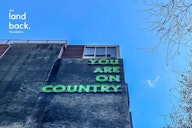
Agents of Change: Insights from First Nations Social Enterprise Leaders
WebinarsThe Land Back Foundation held an interactive session exploring how social enterprises can practice long-term allyship, accountability, and activism. The discussion shared lived experiences and practical actions for embedding equity and justice in everyday business.
Agents of Change: Insights from First Nations Social Enterprise Leaders.png?w=192)
'A Guide to Adaptive Leadership', Acumen Academy
GuidesThis guide introduces adaptive leadership, empowering individuals to lead without formal authority. It explores core principles, distinguishing adaptive challenges from technical problems, and practical steps like shifting perspectives, framing challenges, and fostering collaboration. Additional resources and free courses are included.
'A Guide to Adaptive Leadership', Acumen Academy-1.png?w=192)
'A Guide to Outcomes Contracting and Social Impact Bonds', SVA
GuidesThis guide by Social Ventures Australia (SVA) shares insights from over a decade of outcomes-based contracting and social impact bonds (SIBs) in Australia. It offers practical advice, key lessons, and policy implications for organisations exploring these funding models.
'A Guide to Outcomes Contracting and Social Impact Bonds', SVA
A Guide to Selecting Participatory Research Methods Based on Project and Partnership Goals, Journal of Participatory Research Methods
JournalsThis guide explores participatory research methods designed to align with collaborative project and partnership goals. By involving communities throughout the research process, it promotes equity, trust, and relevance. With actionable frameworks for co-production, it supports researchers and organisations in integrating community knowledge, enhancing outcomes, and fostering long-term collaboration. The guide categorises methods into five domains—engagement, exploration, visual and narrative, mobilisation, and evaluation—while addressing both the strengths and challenges of participatory approaches.
A Guide to Selecting Participatory Research Methods Based on Project and Partnership Goals, Journal of Participatory Research Methods-5.png?w=192)
AI for Impact: The PRISM Framework for Responsible AI in Social Innovation, Schwab Foundation for Social Entrepreneurship
White papersThis report introduces the ‘PRISM Framework,’ a guide for responsibly integrating AI into social innovation. Developed with EY and Microsoft, it offers pathways for organisations at various AI adoption stages. The framework aligns AI with impact goals, highlights scalable approaches, and addresses key considerations like ethics, data security, and transparency.
AI for Impact: The PRISM Framework for Responsible AI in Social Innovation, Schwab Foundation for Social Entrepreneurship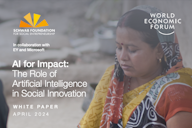
AI for Impact: The Role of Artificial Intelligence in Social Innovation, Schwab Foundation for Social Entrepreneurship
White papersThis report by the Schwab Foundation, EY, and Microsoft explores AI’s transformative role in global social innovation. Drawing on insights from 300 social innovators across 50 countries, it highlights AI’s impact on healthcare, environmental sustainability, and economic empowerment. The report examines barriers to adoption, opportunities for scalable solutions, and ethical considerations, offering case studies and practical guidance for leveraging AI responsibly to address societal challenges.
AI for Impact: The Role of Artificial Intelligence in Social Innovation, Schwab Foundation for Social Entrepreneurship
Amnesty Australia Reconciliation Toolkit
First NationsGuidesFirst NationsThe Reconciliation Toolkit is a practical guide from Amnesty International Australia. It helps workplaces and community groups take meaningful steps toward reconciliation with Aboriginal and Torres Strait Islander Peoples. The resource explains Australia’s history and the purpose of National Reconciliation Week. It supports users to reflect, learn and act. The Toolkit encourages respectful relationships, cultural understanding and everyday actions that promote fairness and inclusion.
Amnesty Australia Reconciliation Toolkit-1.png?w=192)
Amplify Alliance
PlatformsThe Amplify Alliance supports not-for-profit organisations delivering employment and community services across Australia. It advocates for fair labour policies, offers training resources, and fosters collaboration to enhance workforce development.
Amplify Alliance.png?w=192)
‘An Introduction to Community Wealth Building', Ethical Fields
GuidesThis Ethical Fields guide explores community wealth building as a transformative approach to creating equitable, resilient local economies. It highlights principles like local ownership, democratic participation, and wealth redistribution, alongside practical strategies for stakeholders to implement this model in Australia.
‘An Introduction to Community Wealth Building', Ethical Fields.png?w=192)
‘Are We Mates Yet? Agreement-Making Between States and First Nations’, Dr. Tony Dreise
First NationsReportsFirst NationsThis report analyses colonial impacts, truth-telling, and pathways to self-determination, offering insights into decolonisation. While focused on agreement-making between Australian states and First Nations peoples, its strategies for embedding equity and Indigenous sovereignty into governance, policy, and community development have broader relevance.
‘Are We Mates Yet? Agreement-Making Between States and First Nations’, Dr. Tony Dreise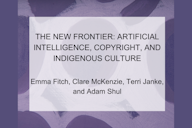
Artificial Intelligence, Copyright and Indigenous Culture – The New Frontier
First NationsArticlesFirst NationsThis article by Terri Janke and Company explores the impact of artificial intelligence on copyright law and Indigenous culture in Australia. It explains how AI technologies raise new risks for protecting Indigenous Cultural and Intellectual Property. The resource discusses ownership, consent, and the use of Indigenous art and knowledge in AI systems. It encourages readers to consider ethical and legal safeguards as digital tools expand.
Artificial Intelligence, Copyright and Indigenous Culture – The New Frontier.png?w=192)
Arts Law Info Sheets
PlatformsArts Law offers free/low-cost legal advice and resources to Australian artists, with targeted services for Indigenous artists and resources for social enterprises.
Arts Law Info Sheets.png?w=192)
Australian Conservation Foundation (ACF): Advocating for a Healthy Environment
PlatformsThe Australian Conservation Foundation (ACF) is a leading environmental organisation dedicated to protecting Australia’s ecosystems, addressing climate change, and promoting sustainable development. Through advocacy, community engagement, and research, ACF empowers individuals and communities to take action on critical environmental issues, from biodiversity and land conservation to climate change. ACF’s work fosters systemic change, driving the transition to a more sustainable future for Australia and the planet.
Australian Conservation Foundation (ACF): Advocating for a Healthy Environment.png?w=192)
Australian Copyright Council (ACC)
PlatformsThe ACC is a non-profit legal service offering resources on copyright law, with guides and fact sheets for creators, including social enterprises.
Australian Copyright Council (ACC)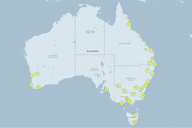
Australian Regenerative Food & Farming Map
PlatformsA growing network of people and businesses is driving regenerative food and farming across Australia—this map brings them into view.
Australian Regenerative Food & Farming Map.png?w=192)
Australian Tax Office (ATO)
PlatformsThe ATO offers essential tax and super info for businesses, including social enterprises, covering worker status, payments, and related obligations.
Australian Tax Office (ATO)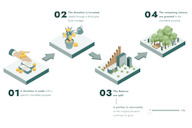
Awqaf: A 1,000-year-old blueprint for modern impact investing
ArticlesThis article explains 'awqaf', an ancient Islamic endowment model that funds public good, and why it might help shape modern impact investing in Australia. It describes how awqaf protect the original donation, provide ongoing community benefits, and invest ethically, offering new ways to support lasting social impact.
Awqaf: A 1,000-year-old blueprint for modern impact investing.png?w=192)
‘B Corps Bring Purpose and Profit for Sustainable Business’, Sustainability Mag
ArticlesCertified B Corporations (B Corps) are redefining business success by proving financial performance and social responsibility can coexist. A recent B Lab white paper highlights how B Corps outperformed traditional businesses during 2019–2021, demonstrating resilience, stronger revenue growth, and higher job retention. Their stakeholder governance model, which balances the interests of employees, communities, the environment, and shareholders, is key to their success. This article explores the impact and growing influence of B Corps in modern business.
‘B Corps Bring Purpose and Profit for Sustainable Business’, Sustainability Mag.png?w=192)
#BeyondtheRules - Balanced governance and ‘behaving well’ everywhere, every day
ArticlesThis article explores the idea of “balanced governance” and why good behaviour in organisations is about more than just following rules. It encourages leaders to think beyond compliance and focus on values, culture, and everyday actions that shape how organisations behave and make decisions.
#BeyondtheRules - Balanced governance and ‘behaving well’ everywhere, every day-11.png?w=192)
‘Boundaries, Burnout, and the ‘Goopification’ of Self-Care’, The Ezra Klein Show, featuring Dr. Pooja Lakshmin
PodcastsThis podcast delves into the evolution of self-care from a radical feminist concept to a commercialised wellness industry, exploring why this shift has failed to curb rising burnout rates. Featuring Dr. Pooja Lakshmin, it challenges superficial wellness trends and offers practical, values-based strategies to redefine self-care for personal and collective empowerment.
‘Boundaries, Burnout, and the ‘Goopification’ of Self-Care’, The Ezra Klein Show, featuring Dr. Pooja Lakshmin.png?w=192)
‘Brave New Work’, Aaron Dignan
VideosThis video features Aaron Dignan, author of Brave New Work, sharing insights on transforming outdated work practices.
‘Brave New Work’, Aaron Dignan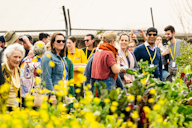
Building and Strengthening Rural Social Enterprise Networks
WebinarsACRE held an informative webinar that explored how social enterprises in rural Australia can build and strengthen networks to overcome the challenges of distance, scale, and under-resourcing. Drawing on insights from rural leaders, funders, and network builders, the session highlighted how collaboration, local leadership, and co-design can foster thriving, place-based ecosystems. It also introduced the upcoming co-design process for a Rural Social Enterprise Network for Australia.
Building and Strengthening Rural Social Enterprise Networks.png?w=192)
Building the Next Generation of Social Entrepreneurs
WebinarsThe ASE Group convened a high-energy webinar exploring how to support and sustain the next generation of social entrepreneurs. Through powerful storytelling, reflection and lived experience, the session unpacked the challenges, motivations and practical tools young founders need to thrive - while centring purpose, resilience, and deep commitment to impact.
Building the Next Generation of Social Entrepreneurs-23.png?w=192)
Bush Heritage Australia: Protecting and Restoring Australia’s Ecosystems
PlatformsBush Heritage Australia is dedicated to conserving Australia’s unique biodiversity by managing ecologically significant land. Through collaboration with Traditional Owners, the organisation restores ecosystems and protects wildlife habitats, contributing to environmental resilience. Bush Heritage’s work focuses on land conservation, Indigenous knowledge integration, and ecological restoration, ensuring the preservation of Australia’s natural heritage for future generations.
Bush Heritage Australia: Protecting and Restoring Australia’s Ecosystems-1.png?w=192)
'Business for good: the size and economic contribution of social enterprise in Australia', Social Enterprise Australia
ReportsThis report by Social Enterprise Australia reveals that 12,033 social enterprises contribute $21.3 billion to Australia’s economy, employing over 206,000 people.
'Business for good: the size and economic contribution of social enterprise in Australia', Social Enterprise Australia-1.png?w=192)
Business Model Canvas Explained
VideosThis short, two-minute video explains the Business Model Canvas. The tool helps people plan and build business ideas for new ventures. It comes from Strategyzer’s book *Business Model Generation* and is used by entrepreneurs and organisations around the world.
Business Model Canvas Explained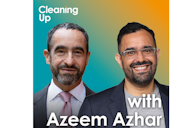
Can Exponential Growth Save a Finite Planet? Cleaning Up Ep187: Azeem Azhar
PodcastsThis episode of the "Cleaning Up" podcast features Azeem Azhar, founder of Exponential View, discussing the role of exponential technologies like AI, renewable energy, and battery storage in addressing climate challenges. The conversation explores sustainable energy strategies, investments in cleaner energy, and the balance between technological progress and environmental stewardship.
Can Exponential Growth Save a Finite Planet? Cleaning Up Ep187: Azeem Azhar.png?w=192)
Centre for Appropriate Technology (CfAT)
First NationsPlatformsFirst NationsThe Centre for Appropriate Technology (CfAT) delivers innovative, community-driven solutions for remote Aboriginal and Torres Strait Islander communities. By integrating Indigenous knowledge with modern technology, CfAT develops essential infrastructure, provides training, and supports sustainable development to enhance self-determination.
Centre for Appropriate Technology (CfAT)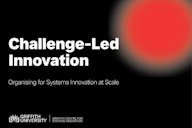
'Challenge-led Innovation: Organising for Systems Innovation at Scale', Griffith Centre for System Innovation (2023)
Case studiesThis resource introduces Challenge-Led Innovation (CLI) as a framework to address complex, large-scale challenges like climate change and inequality. Based on ‘Mission-oriented’ approaches developed by Mariana Mazzucato at UCL IIPP, CLI moves away from traditional innovation models by focusing on collaborative, mission-driven efforts across sectors and communities.
'Challenge-led Innovation: Organising for Systems Innovation at Scale', Griffith Centre for System Innovation (2023)-1.png?w=192)
'Civic Imagination Toolkit', USC
PlatformsThe Civic Imagination Toolkit, developed by USC, helps communities collaboratively envision equitable futures through storytelling and creative activities. It fosters dialogue, inclusion, and trust while empowering groups to address systemic challenges through imagination and innovation.
'Civic Imagination Toolkit', USC
Climate Council: Expert Advice on Climate Solutions
PlatformsThe Climate Council is an independent organisation offering science-based insights into climate change and solutions. It empowers Australians to take informed action on sustainability through research, public education, and community engagement. The organisation provides accessible reports on renewable energy, climate risks, and adaptation strategies, while also supporting citizens with campaigns and resources for climate advocacy, driving awareness and promoting a sustainable future.
Climate Council: Expert Advice on Climate Solutions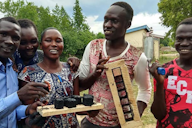
Co-Creating a More Equitable World: The Transformative Benefits of Participatory Design, MIT D-Lab
ArticlesThis MIT D-Lab article introduces participatory design as a powerful approach to fostering equity and creating sustainable solutions by engaging end-users as co-creators. It explores the benefits of building skills, trust, and ownership while producing durable, context-specific outcomes. By tailoring methods to different challenges, participatory design promotes inclusivity and addresses systemic inequities.
Co-Creating a More Equitable World: The Transformative Benefits of Participatory Design, MIT D-Lab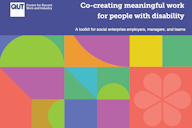
Co-creating meaningful work for people with disability
GuidesThis toolkit developed by Queensland University of Technology is designed for employers, managers and teams who want to create workplaces where people with disability can thrive, contribute their skills, and build meaningful careers.
Co-creating meaningful work for people with disability.png?w=192)
Common Approach to Impact Measurement
GuidesThis guide from Common Approach explains the basics of measuring social impact in a clear and practical way. It outlines five essential practices that form a minimum standard for impact measurement. The resource helps organisations build simple, consistent systems to track results and improve their work.
Common Approach to Impact Measurement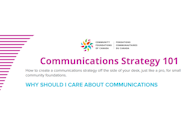
'Communications Strategy 101', Communities Foundations of Canada
GuidesLearn how to create an effective communications strategy with this practical fact sheet for community organisations. Covering key topics such as audience identification, crafting messages, platform selection, and evaluation, it provides a step-by-step guide with exercises and tips to help community foundations implement and refine their communications efforts.
'Communications Strategy 101', Communities Foundations of Canada.png?w=192)
Community Investment for Australia Co-operatives
GuidesThis handbook is a practical guide for communities and practitioners who want to set up a co-operative. It explains how co-operatives can meet local needs, raise funds from members, and build stronger local economies, while working within Australia’s national laws and regulations.
Community Investment for Australia Co-operatives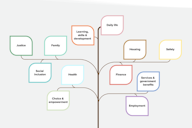
Community Services Outcomes Tree
PlatformsThe Community Services Outcomes Tree is a shared framework that helps community organisations describe and measure the outcomes of their work. It provides clear language and structure so services can show how their activities lead to meaningful change for individuals, families and communities.
Community Services Outcomes Tree.png?w=192)
Community Story Holding and Caretaking
WebinarsThis webinar explores how ethical storytelling can empower rather than exploit, centring the voices of those with lived experience. The presenters share their experiences in co-developing the Transformational Ethical Story Telling (TEST) framework, designed to shift power in storytelling by embedding values-based, anti-oppressive practices into everyday communications, branding, and policy.
Community Story Holding and Caretaking-1.png?w=192)
'Connecting Pathways to Employment with the Work Integration Social Enterprise (WISE) Model', Centre for Social Impact
ReportsThis report by CSI Swinburne introduces the WISE-Ability model, a framework for transforming Australian Disability Enterprises (ADEs) into more inclusive organisations. It supports employment pathways for people with disabilities, aligning with NDIS funding and fostering open employment opportunities.
'Connecting Pathways to Employment with the Work Integration Social Enterprise (WISE) Model', Centre for Social Impact.png?w=192)
Connecting Up (Infoxchange)
PlatformsConnecting Up helps Australian and New Zealand nonprofits strengthen their organisations through technology. This free platform, run by Infoxchange, offers discounted IT products, cloud services, hardware, software, and training by partnering with leading tech companies to empower social impact organisations.
Connecting Up (Infoxchange).png?w=192)
'Core Concepts of Doughnut Economics’, Kate Raworth
VideosThis video introduces Doughnut Economics, a framework by economist Kate Raworth that balances human needs with planetary health. Challenging traditional growth-focused economics, it emphasises well-being within ecological limits. The concept offers a compelling perspective on sustainable development and highlights the role of social enterprises in the impact economy, engaging stakeholders effectively.
'Core Concepts of Doughnut Economics’, Kate Raworth
Costs and benefits of tailored job support programs, Paul Ramsay Foundation
ReportsThis research demonstrates the costs and benefits of tailored employment support programs for people facing complex barriers to work, providing evidence and tools to help funders and organisations make effective investments in job-seeker programs. This report from 2024 aims to collate and strengthen existing evidence of ’what works’ in which contexts, while establishing an evidence base for the type and level of resourcing needed to achieve more enduring outcomes for those facing complex barriers to work.
Costs and benefits of tailored job support programs, Paul Ramsay Foundation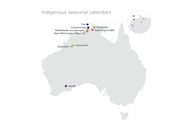
CSIRO Indigenous Seasonal and Cultural Calendars
First NationsGuidesFirst NationsThis resource is a practical guide to Indigenous seasonal and cultural calendars across Australia. It explains how Aboriginal and Torres Strait Islander communities understand natural cycles, weather patterns, plants and animals on Country. The guide shows how these calendars differ by region and reflect local knowledge. It helps viewers learn about Indigenous ways of observing the environment and caring for land and sea.
CSIRO Indigenous Seasonal and Cultural Calendars
CSI Social Impact - Research for Social Impact
PodcastsThe Research for Social Impact Podcast from the Centre for Social Impact (CSI) Swinburne features researchers, practitioners and students discussing social entrepreneurship, finance, impact measurement, innovation and employment reform, offering deep insights into Australia’s social purpose ecosystem.
CSI Social Impact - Research for Social Impact-15.png?w=192)
'Cultural Safety in Australia: Discussion Paper', Lowitja Institute
First NationsWhite papersFirst NationsCultural safety is pivotal for achieving equity and inclusion in health and human services. This paper focuses on embedding cultural safety into systems for Aboriginal and Torres Strait Islander peoples, addressing systemic racism and power imbalances. While primarily health-focused, its insights are applicable across sectors like social enterprise, community development, and governance.
'Cultural Safety in Australia: Discussion Paper', Lowitja Institute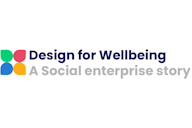
Design for Wellbeing: A Social Enterprise Story
PlatformsThis resource showcases findings from Australian Research Council studies on Work Integration Social Enterprises (WISE). It emphasises the role of social enterprises in enhancing individual and community wellbeing, particularly in disadvantaged and regional areas. The platform offers tools, insights, and strategies for social enterprises, policymakers, and ecosystem supporters to design workplaces and practices that integrate wellbeing principles, address systemic disadvantage, and foster resilience. Key focus areas include regional community wellbeing, youth health equity, and leveraging organisational design to influence positive social outcomes.
Design for Wellbeing: A Social Enterprise Story.png?w=192)
‘Diversity, Equity, & Inclusion in the Workplace: A Strategic and Actionable Guide’, Diversity Australia
GuidesThis Diversity Australia resource provides practical guidance on integrating diversity, equity, and inclusion (DEI) into workplaces. It explores key concepts, outlines benefits like improved culture and business outcomes, and offers strategies for fostering inclusivity. Highlighting leadership's role and the need for ongoing training, it frames DEI as both a moral and strategic imperative, emphasising that building an inclusive workplace requires sustained commitment.
‘Diversity, Equity, & Inclusion in the Workplace: A Strategic and Actionable Guide’, Diversity Australia
Doing Business on Country
WebinarsThe Land Back Foundation held an interactive webinar exploring First Nations’ worldviews on social enterprise and encouraging actors across the social enterprise sector to reflect on our own worldviews and what they mean for our relationships with community and Country.
Doing Business on Country
Do you know of a resource that could benefit the social enterprise sector?
Submit resource

We’d love to hear from you!
Reach out to one of our team members, and share input and ideas about how we can evolve Understorey.
Get in touch